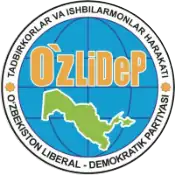Uzbekistan Liberal Democratic Party Oʻzbekiston Liberal Demokratik Partiyasi | |
|---|---|
.png.webp) | |
| Abbreviation | UzLiDeP |
| Official leader | Aktam Haitov |
| President | Shavkat Mirziyoyev |
| Founded | November 15, 2003 |
| Split from | People's Democratic Party of Uzbekistan |
| Headquarters | Mirobod tumani, 700015 Tashkent |
| Newspaper | XXI asr |
| Youth wing | UzLiDeP Youth Wing |
| Membership (2016) | 324,881 |
| Ideology | Economic liberalism Secular liberalism[1] Civic nationalism[1] |
| Political position | Center-right[2] |
| National affiliation | Bloc of Democratic Forces |
| Colours | Azure |
| Legislative Chamber | 53 / 150 |
| Senate | 41 / 100 |
| Party flag | |
.png.webp) | |
| Website | |
| uzlidep | |


The Uzbekistan Liberal Democratic Party (UzLiDeP) (Uzbek: Oʻzbekiston Liberal Demokratik Partiyasi, OʻzLiDeP) is a political party in Uzbekistan and the country's ruling party. The four other parties in the Oliy Majlis, Uzbekistan's parliament, are pro-government.[3]
History
The party was founded in 2003 by Islam Karimov as a split from People's Democratic Party of Uzbekistan, which was led by Karimov from 1991 to until 1996, at which point Karimov stepped down and resigned his membership.[4]
Despite self-identifying with different ideologies, the parties are seen as no different from each other, with the Uzbekistan Liberal Democratic Party being created to give an illusion of a competitive multi-party system; this is supported by the fact that the People's Democratic Party of Uzbekistan remained supportive of Karimov's policies and retained his favor.[5]
Ideology
As the party of the middle class and private property owners, as well as businesspeople, farmers, and the service sector, it promotes economic liberalism and economic liberalization, having liberalized the foreign currency market. The party is nominally liberal and promotes liberal democratic values;[6] however, its liberal practice on economic issues has not been reflected in practice at the political level, as it has ruled an authoritarian state, despite reforms following the death of long-time leader Islam Karimov in 2016.[3]
Electoral history
During the 2004–05 Uzbek parliamentary election, the party won 41 out of 120 seats. In the 2009–10 Uzbek parliamentary election, it won 55 out of 150. It has allied with the Uzbekistan National Revival Democratic Party, a conservative and right-wing party.[3]
In October, the party said that it intended to nominate President Islam Karimov as its candidate in the 2007 Uzbek presidential election, although many considered Karimov to be legally ineligible to run for another term.[7] On 6 November, Karimov was unanimously chosen as the party's presidential candidate at a party convention in Tashkent, and Karimov accepted the nomination.[8] Karimov remained the president until his death in 2016. After the death of Karimov, long-time prime minister and party member Shavkat Mirziyoyev won the 2016 Uzbek presidential election to finish out Karimov's term.[3] Mirziyoyev was re-elected in the 2021 Uzbek presidential election.[9]
Presidential elections
| Election | Party candidate | Votes | % | Votes | % | Result |
|---|---|---|---|---|---|---|
| First round | Second round | |||||
| 2007 | Islam Karimov | 13,008,357 | 90.8% | — | — | Elected |
| 2015 | 17,122,597 | 90.4% | — | — | Elected | |
| 2016 | Shavkat Mirziyoyev | 15,906,724 | 88.6% | — | — | Elected |
| 2021 | 12,988,964 | 80.3% | — | — | Elected | |
| 2023[lower-alpha 1] | 13,625,055 | 87.7% | — | — | Elected | |
- ↑ Shavkat Mirziyoyev formally run as independent candidate.
Legislative Chamber elections
| Election | Leader | Seats | +/– | Position |
|---|---|---|---|---|
| 2004–05 | 41 / 120 |
New | ||
| 2009–10 | Muhammadusuf Teshabaev | 53 / 135 |
||
| 2014–15 | Sodiqjon Turdiev | 52 / 150 |
||
| 2019–20 | Aktam Haitov | 53 / 150 |
References
- 1 2 McCullough, Aoife (July 2015). "The legitimacy of states and armed non-state actors".
- ↑ http://www.jus.uio.no/smr/english/about/programmes/nordem/publications/2008/0208.pdf
- 1 2 3 4 Abdurasulov 2019.
- ↑ Lansford 2015, pp. 1601.
- ↑ Lansford 2015, p. 1604.
- ↑ United Nations 2016.
- ↑ Saidazimova 2007.
- ↑ Sharifov 2007.
- ↑ Eurasianet 2021.
Sources
- Abdurasulov, Abdujalil (20 December 2019). "Questions over Uzbekistan's new era of 'openness'". BBC News. Retrieved 2 November 2021.
- Lansford, Tom (2015). Political Handbook of the World 2015. SAGE Publications. ISBN 9781483371580. Retrieved 2 November 2021 – via Google Books.
- Saidazimova, Gulnoza (4 October 2007). "Uzbek Party Signals Plan To Nominate Karimov For Third Term". Radio Free Europe/Radio Liberty. Retrieved 2 November 2021.
- Sharifov, Omar (7 November 2007). "Islam Karimov agreed to remain the president another seven years". Ferghana. Archived from the original on 11 November 2007. Retrieved 2 November 2021.
- "Uzbekistan: Mirziyoyev romps to victory, but with reduced vote share". Eurasianet. 25 October 2021. Retrieved 2 November 2021.
- "What ideas do political parties advance?". Uzbekistan Today. 15 November 2016. Retrieved 2 November 2021 – via The Permanent Mission of the Republic of Uzbekistan to the United Nations.
External links